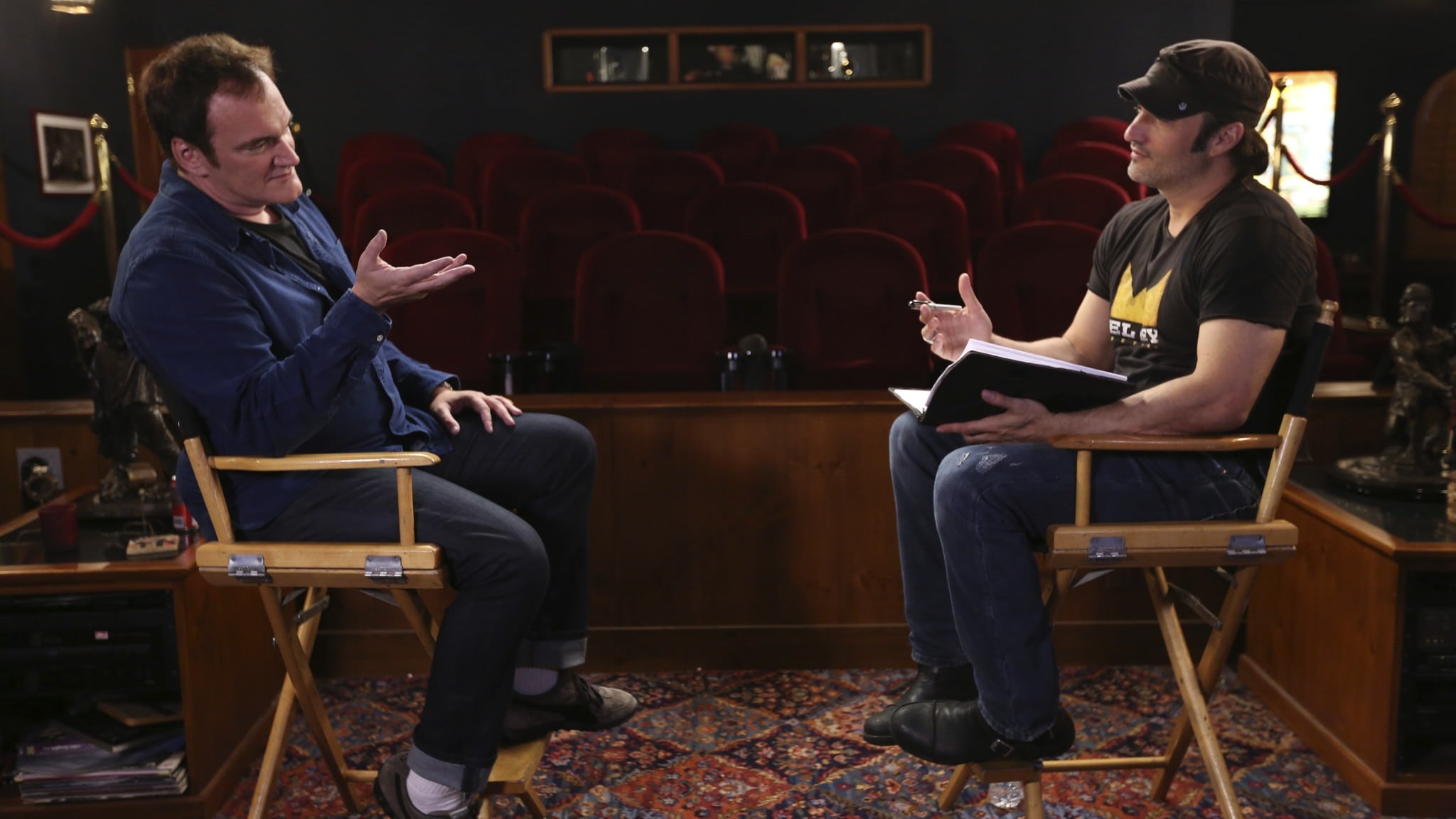Tarantino on El Rey: Neither Inglorious or Vainglorious

Late in his interview with Quentin Tarantino, Robert Rodriguez asks when Tarantino will direct a film without the protective layer of a genre overlaying it. Tarantino whacks the question back to Rodriguez, essentially saying he’s uncomfortable baring his soul on screen; it’s not in the cards.
Those who’ve watch the first of two installments of “The Director’s Chair” [installment II premieres Wed, Sept 17, 9pm, on El Rey, the cable network Rodriguez founded last year; the first part will re-run at 8pm] will not find Tarantino’s answer surprising. For much of the two sessions, Tarantino, an animated and interesting speaker, exposes little about his “process,” which is the topic Rodriguez promised in the earlier installment would be the main topic of discussion.
In defense of Rodriguez, who conducts a pretty good interview, you get the impression the self-taught Tarantino, 51, is a bit of a genius and uncomfortable talking about himself. ‘I don’t do anything special…but I do see the film in my mind,’ he says at one point. As such, getting him to dissect the way he works is a difficult ask, requiring an interviewer who continues to probe, which Rodriguez often forgoes in favor of breadth. An exchange illustrates.
“It’s tough being your friend,” Rodriguez tells Tarantino at one point. “When we’re watching your films I ask you, ‘How do you do that?’”
Tarantino says, “Aw, you know how I do that.”
Rodriguez responds, “No, I really don’t.”
Still, there are many reasons to watch this show, not the least of which is Tarantino’s impressive knowledge of film and film genres. His feistiness is on display, too. He’s mostly modest, but admits making high-level films that are recognized worldwide excites him. “It’s like playing Bobby Fisher-type chess when everyone else is *ucking around with checkers.”
There also are compelling anecdotes detailing Tarantino’s highly successful career—he settled on some of the details for the first of the Kill Bill films while playing shuffleboard in an ale house with Uma Thurman; he wrote Inglourious Basterds (2009) at breakneck speed, furiously scribbling page after page as a form of self-induced therapy after Grindhouse (2007), a collaboration with Rodriguez, flopped at the box office. “I had to prove myself…I didn’t know if anyone would ever come to the theater again [to see his films];” he finds it useful to read new scripts to friends and colleagues, either in person or over the phone, “that way I hear the wrong notes…I hear the laughs…I know when I’ve lost you.” Having produced more than 100 pages of copy for Basterds, Tarantino, in search of an ending, was urged to transform the mammoth script into a television miniseries. When a colleague told Tarantino that he was upset with his choice—‘You are one of the few filmmakers left who makes me want to go to the cinema; other people’s films I can watch on TV or on DVD, but yours I have to go the cinema. So, no, I’m not happy that it will be a TV miniseries and I will have to wait a few more years for your next movie.’—Tarantino found an ending, edited down the script and a film was re-born. In one of his deeper reflections, Tarantino tells Rodriguez that in 20 years, this is the one he thinks “they’ll talk about most.”
All these stories, and many more, make for good television and certainly enhance viewers’ enjoyment of Tarantino’s work. The Director’s Chair, which will feature other directors in future editions, is enhanced by copious footage, illustrating many of the examples Rodriguez and Tarantino discuss. There’s also a treat—home movies of Tarantino reading a treatment he’d written to Rodriguez. That script eventually became Kill Bill (2003). Near the end of the show Tarantino responds to questions from other directors, including Peter Bogdanovich and Francis Ford Coppola. Some of the answers are among the show’s best moments.
To be a good director, you have to be a good audience, Rodriguez says Tarantino once told him. Tarantino’s explication is excellent; he dispels the practice of directors being distant, watching filming on a monitor or even a room away from the stage. No, Tarantino insists, you must stand near the camera because then the actors seem to be acting just for you. When you call cut, they all look at you, he says. That bit of insight is one of the program’s highlights. A nice piece of intelligence from a revolutionary filmmaker.